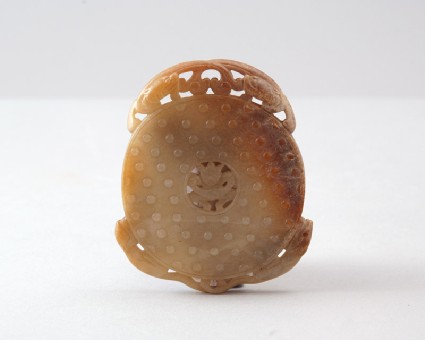Browse: 105 objects
Disc with demons and dragons
- loan
-
Details
- Associated place
- Date
- 1911 - 1963
- Material and technique
- stone, with carved decoration
- Dimensions
-
0.7 cm (height)
8.8 cm (diameter)
- Material index
- Technique index
- Object type index
- No. of items
- 1
- Credit line
- Lent by the Sir Alan Barlow Collection Trust.
- Accession no.
- LI1301.21
-
Further reading
University of Sussex, and Arts and Humanities Research Council, The Barlow Collection, supervised by Regina Krahl, Maurice Howard, and Aiden Leeves (Sussex: University of Sussex, 2006), no. J6
Location
-
- currently in research collection
Objects are sometimes moved to a different location. Our object location data is usually updated on a monthly basis. Contact the Jameel Study Centre if you are planning to visit the museum to see a particular object on display, or would like to arrange an appointment to see an object in our reserve collections.
Publications online
-

The Barlow Collection
The piece was meant to evoke archaic jade discs but neither its uneven shape and carving style nor its iconography are compatible with an early date, and the stone may not actually be jade.
The piece is made from a variegated, pale grey-green to brown stone with an unusually matt, grainy texture. It is carved from a flat, roughly circular disc with a crouching demon figure in the central hole carved in openwork, two entwined addorsed dragons on the rim above and two addorsed tree shrews with entwined tails below. One side shows the stocky demon figure en face, with three tufts of hair on the head and scaly limbs, knees far apart and hands joined, the reverse depicts its scaly back. The animals are similarly depicted from front and back respectively, the dragons with their heads turned, to look at each other.
© 2013 University of Oxford - Ashmolean Museum


